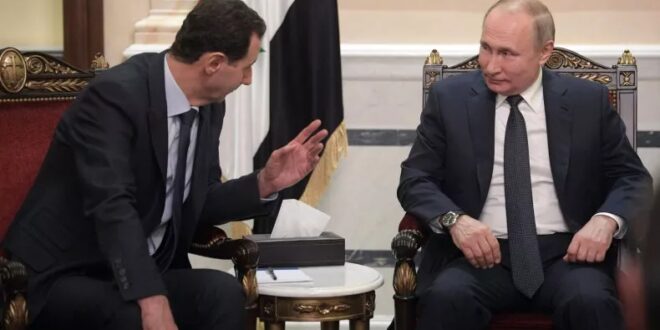Vladimir Putin has been dealt a significant geopolitical blow with the downfall of Bashar al-Assad, whose regime in Syria the Russian president had committed considerable funding and military resources to propping up.
Assad fled Syria and has claimed political asylum in Russia, Kremlin-backed media reported, his now exiled status depriving Moscow of a key regional ally.
Russia’s military assets in Syria are now under threat, such as its naval base in the port city of Tartus, which gave the Kremlin a presence near NATO’s southern flank in the Mediterranean Sea.
“This was their foothold in the Mediterranean, and from there out into the Atlantic—it will be a big blow to lose that,” Edward Lucas, senior fellow at the Center for European Policy Analysis (CPA) told Newsweek.
Retired U.S. Vice Admiral Robert Murrett agreed.
“This is a huge blow to Russia’s prestige in the region,” Murrett told Newsweek. “Syria was absolutely vital to the Russian Navy’s assets operating in the Mediterranean. “
“They may try to hang on to some territory around there with the new government, but even that’s kind of a stretch because of all the support they provided for the Assad regime, ” said Murrett, deputy director of the Syracuse University Institute for Security Policy and Law. “It’s going to be a tough road ahead for the Russians.”
Pro-Moscow military bloggers have expressed concern over the future of the Khmeimim Air Base near the city of Latakia, that was host to Russian aircraft whose bombardment of Aleppo in 2016 was key to Assad retaining power.
Without access to an air force base and a port that were linchpins for Moscow in the region, Murrett said: “Russia will not be in nearly as strong a position.”
Also at risk are tactical outposts like Qamishli Airport in the northeast, while reports of thousands of stranded Russian personnel in Syria and equipment left abandoned point to the military cost for Putin. Russian troops have requested Ankara’s help for for their safe exit, according to CNN Turk.
Newsweek has contacted the Kremlin for comment.
Syrian Prime Minister Mohammad Ghazi al-Jalali said the new authorities would decide what happens to Russia’s military presence but any deal with Putin would have to be in the rebels’ interests and depend on what Moscow can offer.
“This is a game of multi-dimensional chess and Russia’s quite good at this,” said Lucas. “But the strategic weakness of Russia has been exposed and that’s going to make it difficult for them to drive a bargain as good as the one they had with the old regime.”
Putin “has just lost the Middle East,” military analyst Markus M. Keupp posted on X referring to Assad’s fall and noting how Putin had rejected a close relationship with Israel in favor of cooperation with Iran, which is now weakened by Israeli attacks.
Anti-Assad forces may not want to let Putin keep assets in Syria after Moscow’s warplanes had bombed them until recently, said Mark N. Katz, nonresident senior fellow with the Atlantic Council’s Middle East Programs.
In analysis for the think tank published Sunday, Katz said that Russia retaining naval and air bases in Syria may not be possible, “either because a new Sunni-dominated Syrian government proves to be strong and expels the Russians or because Syria descends into such chaos that the safety of the bases cannot be maintained.”
But one positive aspect for Putin is that Assad will not be replaced by a pro-Western regime such as those that followed the Arab Spring revolutions.
Putin can also count on good ties with the UAE, Qatar and Egypt and if there is a power struggle among the victors in Syria, “this may provide Moscow with an opportunity to work with some against others,” added Katz.
Assad took power in 2000—the same year as Putin—and the speed with which his regime has been dispatched will be of concern for Putin.
“The big question for Putin is whether this is part of a ripple of weakness for autocratic regimes where you might see also the mullahs fall in Iran and then suddenly, people think the writing’s on the wall in Moscow,” said Lucas.
“He gets very nervous when there is an infection of geopolitical COVID of autocracies being toppled,” said Lucas whose analysis on Sunday for CEPA outlined the Russian leader’s unease at the capture of Iraqi dictator Saddam Hussein in 2003 and the killing of the Libyan leader, Muammar Gaddafi, in 2011.
“Even though I think this probably won’t lead to a popular uprising in Russia, he will be worrying about this loss and that consumes his political energy and makes his room for maneuver smaller,” Lucas said. “All these authoritarian regimes look like concrete until they turn out to be a meringue.”
 Eurasia Press & News
Eurasia Press & News




